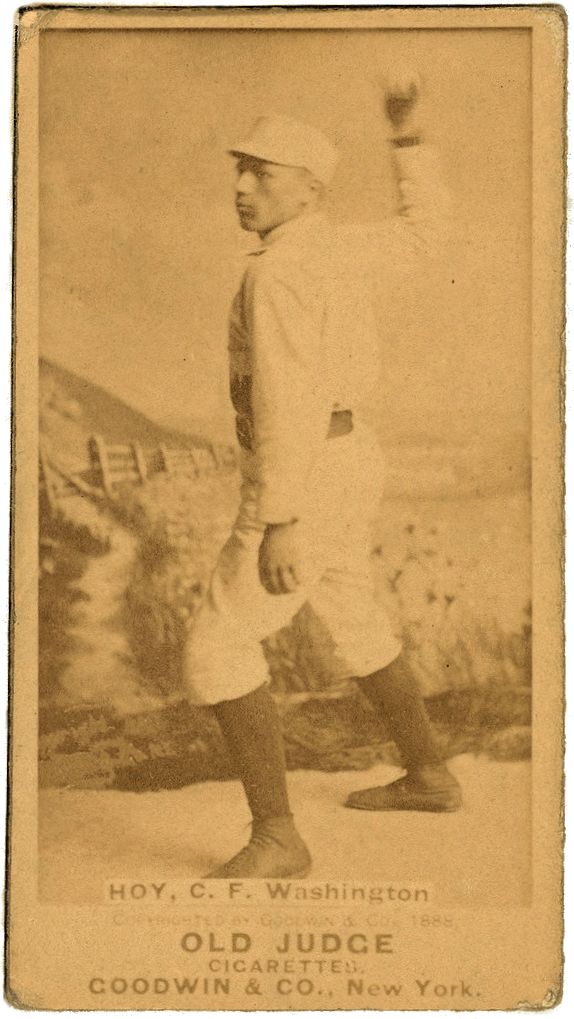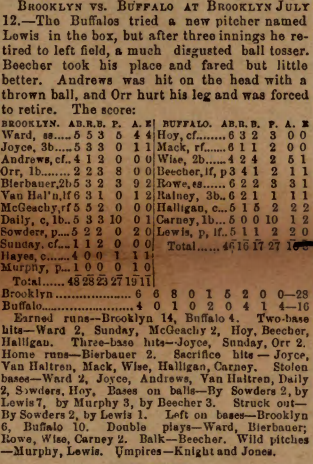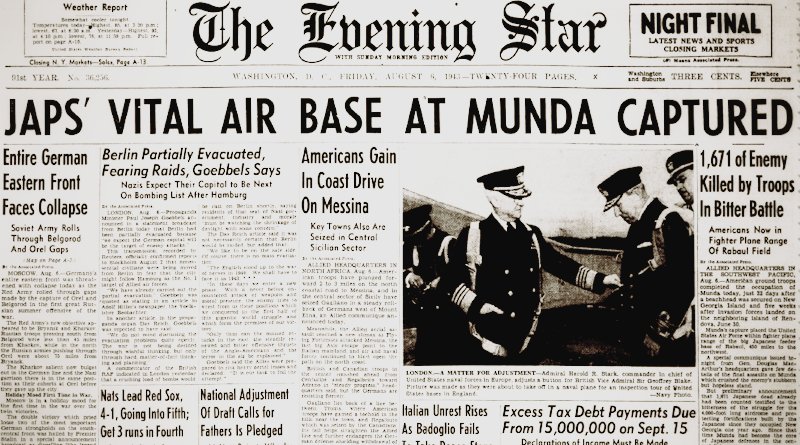World War II Chronicle: August 6, 1943
Click here for TODAY’S NEWSPAPER
On page three we learn that Connie Mack’s former battery mate Pat White has passed away. The article says that Mack caught White for 12 years, but I after spending way too much time trying to track down who Pat White was I came up empty. Mack played 11 years of pro ball, split between the Washington Nationals, Pittsburgh Pirates, and one season with the Buffalo Bisons in the short-lived Players League. Buffalo had a third baseman named Deacon White, but he died in 1939. There’s a Pat Wright who played one game for the Chicago Cubs in 1890 who passed away in May, but that’s the year Mack helped form the Players League that year so the two wouldn’t have even faced each other.
Usually it’s worth diving down these rabbit holes because I always come up with something interesting to share, even if it isn’t even related to what I was originally looking for. But you have to manage expectations when you’re looking through records from 140-odd years ago. Maybe the paper got his name wrong — it happens constantly. Maybe he played under a different name or went by a fun nickname, like players of that era often did. The 1890 Bisons featured General Stafford, Spider Clark, and Dummy Hoy for example.

It’s not impossible that Pat White was “Lewis,” the mysterious local boy who tried out for the team and was put on the mound for Buffalo’s 28-16 pounding by the Brooklyn Ward’s Wonders on July 12, 18901This game held the record for most runs scored until 1922 when the Cubs lost to the Phillies 26-22 at Wrigley Field, which back then was known as Cubs Park.

Well it looks like I struck out as far as finding out who Pat White was. Maybe he made the story up, which would have been fairly easy to do before the internet was invented. But half the fun of writing the World War II Chronicle is finding interesting things from the past you never otherwise would…
George Fielding Eliot column on page six… Obituary for a Spanish-American War veteran on page eight. 1st Lt. Alexander Higbee Davidson earned the Distinguished Service Cross in 1899 and the Silver Star during service on the Mexican border… Sports on page 18, which reports that 20-year-old former Boston Braves pitcher Warren Spahn struck out 17 batters and the only opponents who got on base reached on errors. Spahn enlisted in the Army after appearing in four big league games last year and is a combat engineer. Former Brooklyn first baseman Dolph Camilli hates the Giants so much he is throwing away $1,000 a week by not reporting to New York after his recent trade.
Roving Reporter by Ernie Pyle
SOMEWHERE IN SICILY — Some more shipboard sketches:
Joe Talbot. He is an aviation ordnanceman first class, and since there is no aviation aboard his ship he is a round peg in a square hole. Of course that isn’t his fault.
What he actually does is a little bit of everything, when things are normal, and during battle he is the head of a crew down in a magazine of big shells. He wears headphones, and upon orders he shoots more ammunition up to the gun batteries above.
Joe is a black-haired, straight-shouldered Southerner from Columbus, Ga. In civil life he was a photographer on The Columbus Ledger-Inquirer. The last big story he photographed was Eddie Rickenbacker’s crash near Atlanta. Joe has been married four years. His wife works at Woolworth’s store in Columbus.
This is his second time in the Navy. He was in it from 1931 to 1935, and he has been in two years this time. He has no intention of making it a career. He has one great post-war ambition — he says he’s going to do it in the first six months after he gets out. He’s going to buy a cabin cruiser big enough for four and cruise down the Chattahochee River to the Gulf of Mexico, then up the Suwanee, making photos of the whole thing in color.
Tom Temple. His full name is Thomas Nicholas Temple. His father deliberately put in the middle name so his initials would make TNT. Tom is only 19. He is tall and thin, and very grave and analytical. He talks so slowly you think sometimes he’s going to stop altogether. After the war he wants to go to Harvard and then get into the publishing business. Tom’s mother is a high school teacher at Far Rockaway, L.I., and writes on the side. She used to write for Story magazine under the name, Jean Temple.
Tom’s father was wounded in the last war. He is now in the big veteran’s hospital at Albuquerque, only a short way from my home.
Tom says when he first came into the Navy the sailors’ profanity shocked him, but now it rolls off his back like water off a duck. Tom is a seaman second class. He is very sincere and thoughtful and one of my favorites aboard the ship.
Joe Ederer. He is a lieutenant commander and chief engineer of the ship, and he was my part-time host while I was aboard, since I did all my writing in his cabin. Furthermore, I ate his candy, smoked his cigarets, used his paper, and would have read his mail if I could have found it.
Commander Ederer has been at sea for more than a quarter of a century. He is out of the merchant service, and he indulges in constant pleasant feuds with his regular Navy friends.
His home is in Portland, Ore. His wife is used to waiting, so his sentence is not as hard on her as it is on many wives. They have a 15–year-old boy upon whom the chief engineer dotes. He has two pictures of his family on his shelves.
Ederer is one of the very few officers of this ship who are genuine salts. He is not exactly a Colin Glencannon, but they have many things in common. Ederer spent many years on the Orient run and has a personal hatred for the Japs. He has been with his present ship ever since she was commissioned two years ago, and he hopes this part of the war soon gets over so he can get to the Pacific.
Like all sailors he wants some day to get five acres, preferably in the Oregon woods, build a cabin and have a crick running past his door. If he ever did he probably go nuts.
Evening star. (Washington, D.C.), 6 August 1943. Chronicling America: Historic American Newspapers. Lib. of Congress.
https://chroniclingamerica.loc.gov/lccn/sn83045462/1943-08-06/ed-1/
